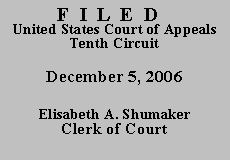

| CLARA A. SIMS, an individual,
Plaintiff-Appellee, v. GREAT AMERICAN LIFE INSURANCE CO., sued as: The Great American Life Insurance Company, Defendant-Appellant. |
|
In the meantime, Ms. Sims moved in the district court for attorney's fees pursuant to Okla. Stat. tit. 36, § 3629(B). Section 3629(B) provides that "[u]pon a judgment rendered to either party" on a claim for insurance benefits, "costs and attorney fees shall be allowable to the prevailing party." Ms. Sims contended that she was entitled to an award of attorney's fees on both her breach of contract and bad faith claims, and sought a total award of $189,362 in fees.(1) Great American objected to her request for an award of that portion of the fees she had expended to obtain a verdict on her bad faith claim, contending that either the bad faith recovery was a double recovery of her insured loss, or that the "core element" of her damages, giving rise to the award under § 3629(B), was not present in the tort claim. See Taylor v. State Farm Fire & Cas. Co., 981 P.2d 1253, 1256 (Okla. 1999) ("Recovery authorized by § 3629(B) embraces both contract- and tort-related theories of liability so long as the 'core element' of the damages sought and awarded is composed of the insured loss.") (emphasis in original).
A magistrate judge assigned to the issue of attorney's fees prepared a report and recommendation proposing that Ms. Sims be awarded $171,456 as a reasonable attorney's fee under § 3629(B). This figure included fees attributable to the bad faith claim. The magistrate judge, however, disallowed certain fees for other reasons, and reduced the amount requested by Ms. Sims. In its objections to this report, Great American again contended that Ms. Sims was not entitled to fees for prevailing on the bad faith claim. The district court rejected Great American's argument concerning fees for the tort claim, sustained in part Ms. Sims' objections to the magistrate's recommendations, and entered a fee award in the amount of $176,378.60. Great American appealed.
On November 7, 2006, acting on Great American's merits appeal, this court entered an opinion reversing the underlying judgment in part. Sims v. Great Am. Life Ins. Co., ___ F.3d ___, No. 04-5135, 2006 WL 3200866 (10th Cir. Nov. 7, 2006). While the panel upheld the award of damages for breach of contract, see id. at *21, it reversed the district court's denial of judgment as a matter of law on the bad faith claim, reasoning that insufficient evidence of bad faith had been presented to sustain the jury's verdict on that claim. Id. at *18-*20. The panel also reversed the punitive damages award, holding that it could not stand absent a finding of bad faith, and that in any event, Great American's conduct did not demonstrate the kind of fraud or evil intent required to sustain a punitive damages award. Id. at *20. Ms. Sims is therefore no longer the "prevailing party" as to the bad faith claim.
There remains the issue of how to adjust the attorney's fee award for Ms. Sims' appellate loss on the bad faith claim. Great American refers us to an itemization it presented to the district court, in which it concluded that the attorney's fees related to the bad faith claim amounted to $19,749. It requests that we simply modify the award by subtracting that amount. We conclude, however, that we should instead remand for further district court scrutiny of this issue.
Oklahoma law permits only those attorney's fees that reasonably contributed to the recovery of Ms. Sims' insured loss. See Taylor, 981 P.2d at 1256 (stating recovery of attorney's fees under § 3629(B) "embraces both contract- and tort-related theories of liability so long as the 'core element' of the damages [recovered] is composed of the insured loss."); see also Badillo v. Mid Century Ins. Co., 121 P.3d 1080, 1107 (Okla. 2005) (discussing "insured loss" and "core element" concepts). Although Ms. Sims cannot recover attorney's fees for work related solely to her failed bad faith claim, the bad faith and contract claims overlap to an extent. In order to prove her bad faith claim, Ms. Sims had to establish that the insurance contract was breached. See Christian v. Am. Home Assurance Co., 577 P.2d 899, 905 (Okla. 1977). We therefore conclude that the district court need disallow only those attorney's fees related specifically to the issue of whether Great American acted in bad faith in failing to pay her claim, as the resolution of that issue did not contribute to recovery of the insured loss.
We therefore VACATE the district court's award of attorney's fees in favor of Ms. Sims, and REMAND for recalculation of the fees to be awarded, in light of our opinion in Sims and the foregoing discussion.
Entered for the Court
Circuit Judge
*. After examining the briefs and appellate record, this panel has determined unanimously to grant the parties' request for a decision on the briefs without oral argument. See Fed. R. App. P. 34(f); 10th Cir. R. 34.1(G). The case is therefore ordered submitted without oral argument. This order and judgment is not binding precedent, except under the doctrines of law of the case, res judicata, and collateral estoppel. It may be cited, however, for its persuasive value consistent with Fed. R. App. P. 32.1 and 10th Cir. R. 32.1.
1. In her district court reply brief on the fee issue, Ms. Sims adjusted the overall amount sought to $187,439.50.